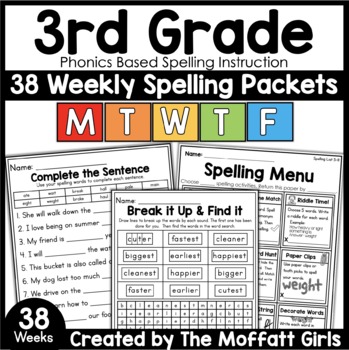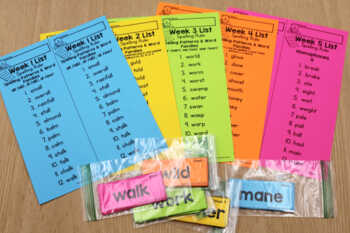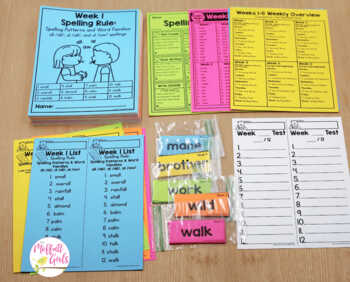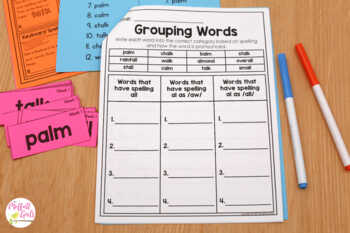3rd Grade Spelling Practice, Phonics + Heart Words, Test Templates, NO PREP
- Zip
What educators are saying
Description
Weekly Spelling Packets! Get ready to transform your weekly spelling routines! No more random list of words! This fun, hands-on and engaging 38 Week Spelling Program is phonics based!
Also available:
What is Included?
- 38 Weeks of Spelling packets Monday - Thursday practice/ Friday Test
- 9 Spelling Menus - one for each new Focused Phonics Skill
- Built in Spiral Review of Spelling Rules
- Weekly Packet Covers with the Spelling Rule and words on front cover
- Flashcards for each List
- Spelling List
- Spelling Test Paper
- Overview of all Spelling Lists
- Overview of all Activities
How are the Word Chosen?
Phonics Based Spelling
Each week focuses on a phonics skill or spelling rules. Like phonics-based reading instruction, phonics-based spelling builds a deep understanding of the patterns in words. As a result, students will not need to learn to spell one word at a time. Instead, they will learn patterns that they can apply to any word. With phonics-based spelling students will systematically and incrementally improve their ability to spell both simple and complex words.
Ways to use this Curriculum:
Traditional Weekly Spelling & Assessments
- Assign students one word list a week.
- Use the provided activities throughout the week for fun hands-on practice.
- Assess your students at the end of the week with one of the provided spelling test templates.
Word Study & Centers
- Practice the words together each day in morning meeting.
- Use the provided activities for centers, morning work, or seat work throughout the week.
Extension or Intervention
- Use this curriculum as an extra challenge for advanced kindergarten students.
- Use this curriculum as intervention for older students in need of extra phonics and sight word practice.
Weekly Breakdown and Overview
Week 1: Spelling Rule: Spelling Patterns and Word Families
- Focus: All /all/, Al /all/, Al /aw/
Week 2: Spelling Rule: Spelling Patterns and Word Families
- Focus: Wild Old Words O and i are sometimes long in one-syllable words ending in ld, nd, st, or lt (-old, -ost, -olt, -ind, -ild families)
Week 3: Spelling Rule: Spelling Patterns and Word Families
- Focus: Wor /wer,/ Wa /wo/, War /wor/
Week 4: Spelling Rule: Spelling Patterns and Word Families
- Focus: Short u can be spelled o This most oven happened before v, n, and th
Week 5: Spelling Rule: Homophones
- Focus: a sounds
Week 6: Spelling Rule: Homophones
- Focus: e and o sounds
Week 7: Spelling Rule: Homophones
- Focus: i, diphthongs, and other vowel pairs
Week 8: Spelling Rule: Homophones
- Focus: Bossy R
Week 9: Spelling Rule: Jobs of final e We know silent E usually makes the vowel say its name but final e has other jobs too
- Focus: Make c and g soft Add a needed vowel to c+le syllables Words don’t end in v
Week 10: Spelling Rule: Jobs of final e
- Focus: Makes th voiced Shows that a word ending in s is not plural
Clarifies the meaning of homophones
Week 11: Review
Week 12: Prefixes
- Focus: in- & im-: not (im- is used before p) Fore- before
Week 13: Prefixes
- Focus: Non- not or no Uni- one Over- too much
Week 14: Spelling Rule: Prefixes
- Focus: De- opposite Under- below Dis- not
Week 15: Spelling Rule: Suffixes
- Focus: -er, -est
Week 16: Spelling Rule: Suffixes
- Focus: -er, -or, -ist- one who/ that which -er is the most common
-or often follows ct or it
Week 17: Spelling Rule: Suffixes
- Focus: -ment act, process -ion act of, state of, result of -al relating to.
Week 18: Spelling Rule: Suffixes
- Focus: -ous full of -ish like, about, or belonging to -less without
Week 19: Review
Week 20: Spelling Rule: Syllabication Words are made of 1 or more syllables.
There are 6 different types of syllables addressed:
- closed
- silent e
- open
- vowel teams (including long vowels and diphthongs)
- r controlled
- c+le
- Focus: Simple closed- vowels are short and syllables are closed
Week 21: Spelling Rule: Syllabication
- Focus: Complex closed- vowels are short and syllables are closed but include consonant blends and/or digraphs
Week 22: Spelling Rule: Spelling Rule: Syllabication
- Focus: /ch/ spelled tch after a short vowel /j/ spelled dge after a short vowel
/k/ spelled ck after a short vowel
Week 23: Spelling Rule: Spelling Rule: Syllabication
- Focus: Silent e
Week 24: Spelling Rule: Spelling Rule: Syllabication
- Focus: Open
Week 25: Spelling Rule: Spelling Rule: Syllabication
- Focus: Vowel teams- long vowels
Week 26: Spelling Rule: Spelling Rule: Syllabication
- Focus: Vowel teams- diphthongs & other vowel pairs
Week 27: Spelling Rule: Spelling Rule: Syllabication
- Focus: R controlled
Week 28: Spelling Rule: Spelling Rule: Syllabication
- Focus: Consonant +le
Week 29: Review
Week 30: Spelling Rule: Schwa
- Focus: Beginning schwa a in a multi syllable word
Week 31: Spelling Rule: Schwa
- Focus: Ending schwa a in a multi syllable word
Week 32: Spelling Rule: Schwa
- Focus: Vowel +l at the end of a multi syllable word
Week 33: Spelling Rule: Schwa
- Focus: Vowel +n at the end of a multi syllable word
Week 34: Spelling Rule: Silent Letters
- Focus: H can be silent
Week 35: Spelling Rule: Silent Letters
- Focus: T can be silent after s
Week 36: Spelling Rule: Silent Letters
- Focus: L is sometimes silent after a vowel U is sometimes silent
Week 37: Spelling Rule: Ei and ie
- Focus: In the middle of a word ie usually says long e
Long e can also be spelled ei when it comes after c or in other exceptions
Week 38: Review
More Questions?
Feel free to email me at themoffattgirls@gmail.com
Be sure to follow the Moffatt Girls on:
- Visit my blog at The Moffatt Girls Blog
- Follow me on Facebook
- Follow me on Instagram
- Join my FREE private group, The Moffatt Girls-Engage Group, to see how other teachers, parents, and homeschoolers are using and organizing Moffatt Girl Curriculum!





